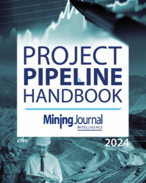This article is 4 years old. Images might not display.
A definitive feasibility study estimated all-in sustaining costs of $2510/t of lithium carbonate equivalent, with "stable boric acid revenue" helping "ensure" an EBITDA margin of 68%.
The project's after-tax net present value is $1.26 billion, with an unlevered internal rate of return of 20.8%.
Rhyolite Ridge will feature average production of 20,600t per annum of lithium carbonate, converting in year four to 22,000tpa of battery-grade lithium hydroxide, and 174,400tpa of boric acid.
A lithium carbonate equivalent price averaging $13,200/t is used over the 26-year life-of-mine.
Benchmark Mineral Intelligence's current price range for battery grade lithium hydroxide is $10,000-11,000/t.
Rhyolite Ridge's production of boric acid is modelled to provide the project with a credit of $710/t, with the acid said to have traded in a range of $600-900/t over the past century. Should boric acid's price fall to $500/t, ioneer says its AISC would be $4340/t.
The $785 million capex estimate represents an increase of $186 million from the PFS, with nearly half of the increase in scope being driven by the inclusion of an on-site steam turbine, the purchase versus lease of the mining fleet, and the purchase of sulphur tankers to materially lower sulphur transportation costs.
The changes would add $30 million per annum to the project's bottom line.
The aim is to begin construction in the third quarter next year.
In terms of financing, managing director Bernard Rowe told a conference call the current expectation is a strategic partner will acquire an equity interest in Rhyolite Ridge.
Ioneer ended the March quarter with A$53 million cash.
Shares in ioneer were up 15% to 15c in morning trade, capitalising the company at $252 million.























